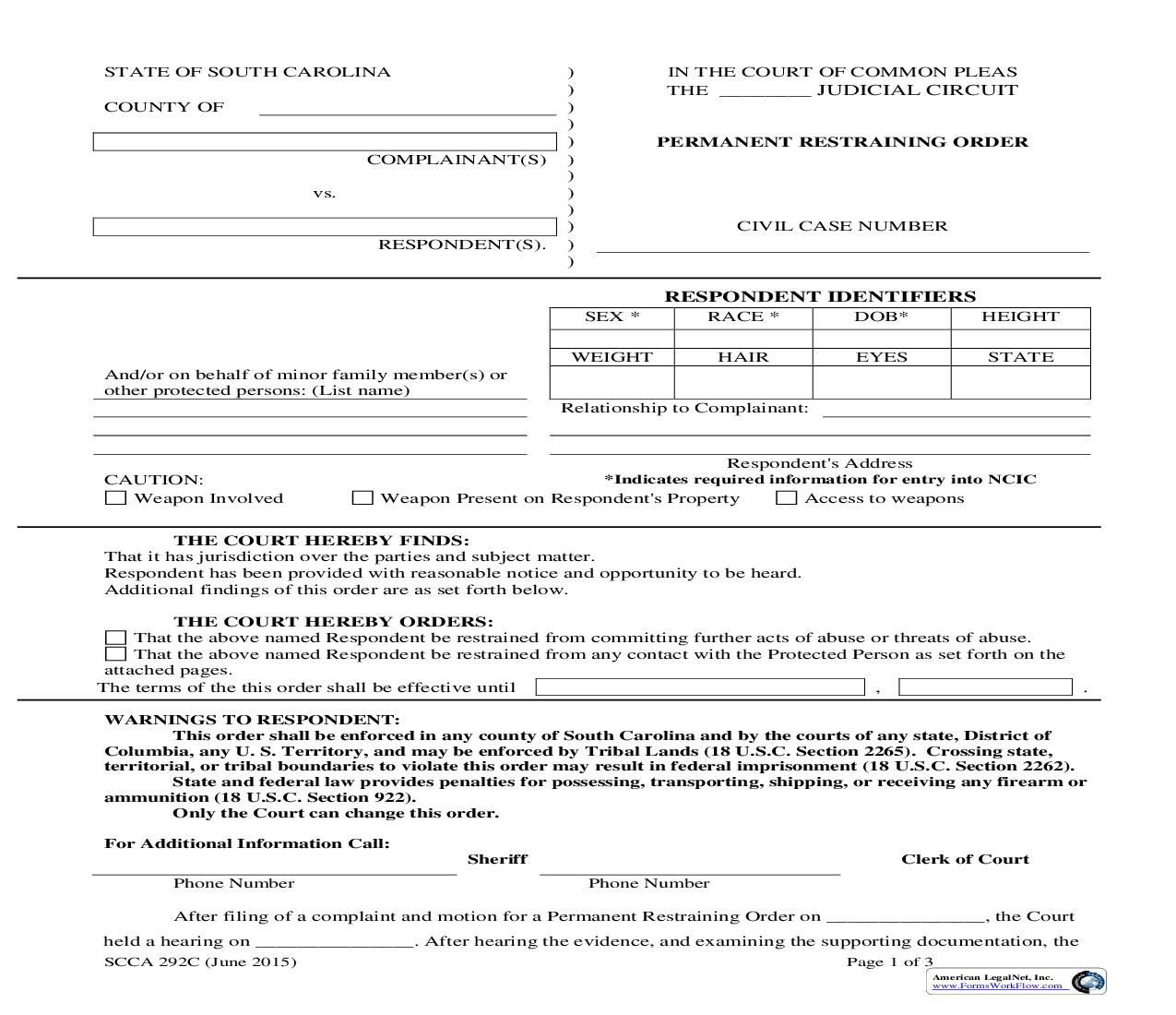South Carolina
Statewide
Court Of Common Pleas
 200 Ratings
200 Ratings

Last updated: 7/24/2015
Permanent Restraining Order {SCCA-292C}
Start Your Free Trial $ 15.99What you get:
- Instant access to fillable Microsoft Word or PDF forms.
- Minimize the risk of using outdated forms and eliminate rejected fillings.
- Largest forms database in the USA with more than 80,000 federal, state and agency forms.
- Download, edit, auto-fill multiple forms at once in MS Word using our Forms Workflow Ribbon
- Trusted by 1,000s of Attorneys and Legal Professionals
Description
SCCA-292C - Permanent Restraining Order. www.FormsWorkflow.com
Related forms
-
 Application For Post Conviction Relief
Application For Post Conviction Relief
South Carolina/Statewide/Court Of Common Pleas/ -
 Notice Of Appointment (Common Pleas)
Notice Of Appointment (Common Pleas)
South Carolina/Statewide/Court Of Common Pleas/ -
 Order-Decision
Order-Decision
South Carolina/Statewide/Court Of Common Pleas/ -
 Summons For Arbitration
Summons For Arbitration
South Carolina/Statewide/Court Of Common Pleas/ -
 Certificate Of Service
Certificate Of Service
South Carolina/Statewide/Court Of Common Pleas/ -
 Notice Of Confiscation-Request For Confiscation Hearing
Notice Of Confiscation-Request For Confiscation Hearing
South Carolina/Statewide/Court Of Common Pleas/ -
 Release Of Confiscated Vehicle
Release Of Confiscated Vehicle
South Carolina/Statewide/Court Of Common Pleas/ -
 Order Ff Appointment (Common Pleas-Family Court)
Order Ff Appointment (Common Pleas-Family Court)
South Carolina/Statewide/Court Of Common Pleas/ -
 Subpoena In Civil Case
Subpoena In Civil Case
South Carolina/Statewide/Court Of Common Pleas/ -
 Summons
Summons
South Carolina/Statewide/Court Of Common Pleas/ -
 Verification
Verification
South Carolina/Statewide/Court Of Common Pleas/ -
 Motion And Order Information Form And Cover Sheet
Motion And Order Information Form And Cover Sheet
South Carolina/Statewide/Court Of Common Pleas/ -
 Motion And Affidavit To Proceed In Forma Pauperis
Motion And Affidavit To Proceed In Forma Pauperis
South Carolina/Statewide/Court Of Common Pleas/ -
 Order-Complex Case
Order-Complex Case
South Carolina/Statewide/Court Of Common Pleas/ -
 Consent Order Fast Track Jury Trial And Appointment Of Special Hearing Officer
Consent Order Fast Track Jury Trial And Appointment Of Special Hearing Officer
South Carolina/Statewide/Court Of Common Pleas/ -
 Judgment In A Civil Case
Judgment In A Civil Case
South Carolina/Statewide/Court Of Common Pleas/ -
 Certification Of Indigent Representation
Certification Of Indigent Representation
South Carolina/Statewide/Court Of Common Pleas/ -
 Summons And Notice Of Hearing
Summons And Notice Of Hearing
South Carolina/Statewide/Court Of Common Pleas/ -
 Permanent Restraining Order
Permanent Restraining Order
South Carolina/Statewide/Court Of Common Pleas/ -
 Complaint For Permanent Restraining Order
Complaint For Permanent Restraining Order
South Carolina/Statewide/Court Of Common Pleas/ -
 Response To Request To Correct Data Entry Error
Response To Request To Correct Data Entry Error
South Carolina/Statewide/Court Of Common Pleas/ -
 Request To Correct Data Entry Error
Request To Correct Data Entry Error
South Carolina/Statewide/Court Of Common Pleas/ -
 Data Entry Error
Data Entry Error
South Carolina/Statewide/Court Of Common Pleas/ -
 Certificate Of Technical Failure Or Technical Difficulties
Certificate Of Technical Failure Or Technical Difficulties
South Carolina/Statewide/Court Of Common Pleas/ -
 Notice Of Assignment Of Arbitrator
Notice Of Assignment Of Arbitrator
South Carolina/Statewide/Court Of Common Pleas/ -
 Affidavit Of Default
Affidavit Of Default
South Carolina/Statewide/Court Of Common Pleas/ -
 Civil Action Coversheet
Civil Action Coversheet
South Carolina/Statewide/Court Of Common Pleas/ -
 Claim For Property Damage
Claim For Property Damage
South Carolina/Statewide/Court Of Common Pleas/ -
 Motion For Case Assignment To The Business Court Program
Motion For Case Assignment To The Business Court Program
South Carolina/Statewide/Court Of Common Pleas/ -
 Agreement
Agreement
South Carolina/Statewide/Court Of Common Pleas/ -
 Notice Of Arbitration Hearing
Notice Of Arbitration Hearing
South Carolina/Statewide/Court Of Common Pleas/ -
 Request To Be Excused From E-Filing
Request To Be Excused From E-Filing
South Carolina/Statewide/Court Of Common Pleas/ -
 Affidavit Of Service (Claim Served Herewith)
Affidavit Of Service (Claim Served Herewith)
South Carolina/Statewide/Court Of Common Pleas/ -
 Subpoena Duces Tecum
Subpoena Duces Tecum
South Carolina/Statewide/Court Of Common Pleas/ -
 Notice Of Confiscation Hearing
Notice Of Confiscation Hearing
South Carolina/Statewide/Court Of Common Pleas/ -
 Transcript Of Judgment
Transcript Of Judgment
South Carolina/Statewide/Court Of Common Pleas/
Form Preview
Sorry, we couldn't download the pdf file.
Our Products
Contact Us
Success: Your message was sent.
Thank you!







